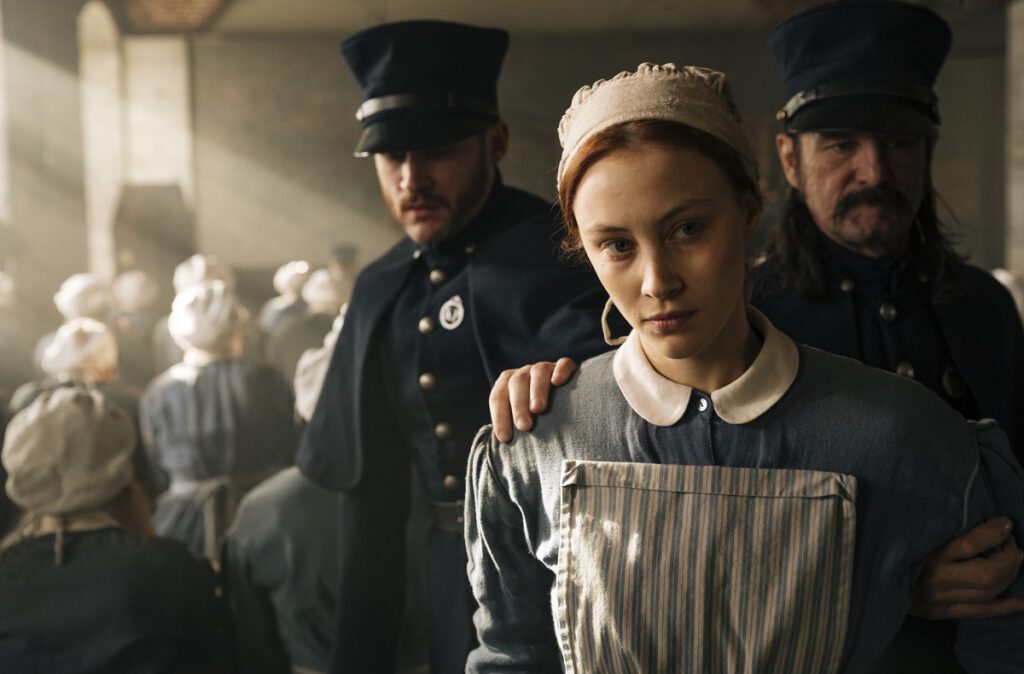It’s perhaps no surprise that, in 2017, we’re experiencing something of a Margaret Atwood boom. It’s difficult to banish Hulu’s Emmy-winning “The Handmaid’s Tale” from the mind as Netflix’s “Alias Grace,” premiering in its entirety this Friday, November 3rd, unfolds: both stories center on complex women, each of whom is something of an unreliable narrator; both are played by performers of incredible skill, able to wield silence and stillness as a surgeon might a scalpel; the sources for both were timely when first published, but each has lately taken on greater resonance. Most importantly, Sarah Polley’s adaptation of “Alias Grace” accomplishes something “The Handmaid’s Tale” did, but in an even more effective manner: it tells a story of one woman that’s also a story about women as a whole, and about the roles, fictional and otherwise, they’re forced to play.

It’s also a true-crime story—albeit one fictionalized by Atwood in her book of the same name—about quilts, kerchiefs, surviving wrongs and still hanging out the laundry. Grace Marks (the remarkable Sarah Gadon) is an inmate in a Canadian prison, condemned for her role in a gruesome double murder. Convinced of her innocence, a society led by Reverend Verringer (David Cronenberg) hires psychologist Simon Jordan (Edward Holcroft) to evaluate her and draft a statement in support of her immediate pardon and release. Through the course of their interviews, conducted in the sewing room of the prison’s Governor’s home, Grace tells a story. Her tale is of a childhood dominated by abuse, a life spent in service, and the making and loss of dear friend Mary Whitney (Rebecca Liddiard)—and it ends in blood. Jordan is fascinated by the tale, and by the woman, and he has no idea how much of it is true. Neither, perhaps, does Grace herself.
The audience certainly won’t. The ambiguities of “Alias Grace” are among its greatest strengths, and they’re handled with remarkable finesse by director Mary Harron (“American Psycho”) and her top-flight cast. Gadon is given the highest bar to clear by far, and does so nimbly. Each time a new perspective is offered on a given scene—for example, the murder of Nancy Cartwright (Anna Paquin) as told by the man who was condemned as her conspirator (Kerr Logan) as opposed to the version Grace gave in her initial confession—we see a different Grace, informed by what those listening or observing might want to see or hear. Gadon’s Grace is both inscrutable and guileless, vulnerable and frightening, each face sliding neatly into place when the story calls for it, and vanishing as soon as she’s back in her cell, alone with her thoughts. You’re somehow made to feel an intimacy with this woman even as you know you’re being kept at a distance, and the result is an internalized performance that’s focused on keeping the truth at bay. Grace doesn’t have much use for the truth. She knows the narrative doesn’t belong to her, anyway, and somehow, she uses that to her advantage.

Gadon’s far from the only standout, though “Alias Grace” belongs so much to her that it’s easy to bypass the rest of the excellent ensemble. However, it would be a shame to ignore the moody work of Holcroft, who makes Jordan Grace’s opposite, a man whose glass face betrays his great confusion, distress, attraction, and repulsion at nearly every turn. Worse would be bypassing Liddiard and Paquin, who play women of very different natures who find themselves similarly destroyed by a world in which women lack control over their bodies, their livelihoods, and even their stories. Liddiard is particularly excellent, a cannonball shot into a china cabinet. And in his turn as Jeremiah, a peddler and magician turned mentalist, Zachary Levi turns charm into a chisel, creating a huckster who the audience, like Grace, will desperately want to believe.
Like her cast, Harron plays with all that ambiguity like a kid in a puddle. Any hints we’re given about the truth, such as it is, come not from the characters or the story, but from Harron’s lens: a flash of a body thudding into a cellar, a cream-colored boot kicking in the dirt, a shirt stuck billowing from the branches of a tree. These violent flashes punctuate the silence so infrequently that each subsequent appearance hits just a little harder, in contrast with the horrors of Grace’s telling, which are shown relentlessly and unsparingly, as if Grace herself is prolonging our immersion in them. Harron’s created a series so spare, still, and beautiful—the Canadian landscapes are rapturously filmed—that it’s easy to forget exactly how gruesome it can be.
As much as Harron brings to the production, there’s another person who gives Gadon a run for her money in the “Alias Grace” VIP race, and it’s Polley herself. Weaving together two separate framing devices—the interviews between Grace and Dr. Jordan, and a letter Grace is writing to the doctor following a future departure—Polley underlines the unreliability of her narrator from the series’ first moments. It frees both she and Gadon up from the burden of the facts, instead creating a portrait of a woman who knows she’ll never be seen as she is. The truth doesn’t matter, so she tries on many supposed truths—murderess, victim, fool, manipulator, innocent, temptress, pawn, mastermind—in the hope of telling whatever story those listening most want to hear. That group includes those of us at home, waiting for answers that will never come. The truth of Grace Marks’ story isn’t available, but Polley has other truths to tell. The murders may be gruesome, but the violence visited on women of that era—and of this one—is no less horrifying.












